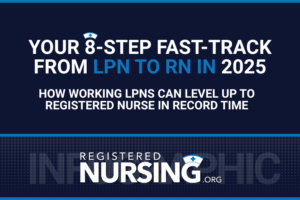5 Tips for Breaking into Nursing Leadership
After many opportunities and encouragement from your leadership team, you have decided to plunge into nursing leadership. Whether your first role is Charge Nurse, Supervisor, Assistant Nurse Manager, or Manager, most of these positions require some leadership experience. But how does one get experience if all "entry-level" positions require knowledge and expertise? The answer may be more straightforward than you think, but it will require communication and creativity.
Leadership can be described as those who influence people and processes for improvement. If you are considering a leadership position, chances are you are already acting like an informal leader (those with the drive to influence others and processes yet without the formal title of manager, etc.). Even informal leadership can play a significant role when applying for formally titled positions. Here are some tips on breaking into management roles without "official" leadership experience:
Spruce Up Your Resume
Capitalize on any leadership roles before or outside of nursing on your resume. Were you a camp counselor in high school? "Activity and Personal Development Supervisor in a small group setting for XYZ company." It is not uncommon for nurses to discount or downplay the jobs outside of nursing simply because they do not believe the roles are relevant. "Managing people and processes is the same no matter what the setting," states Catherine Burger, BSN, MSOL, RN, a board-certified executive nurse leader with nearly 30 years in nursing. "The names change, but most settings’ behaviors and drivers toward excellence are the same. The ability to lead people, especially in stressful situations, should be considered when reviewing a candidate's experience for leadership positions regardless of whether or not it was in nursing."
Find a Sponsor
Not necessarily your supervisor or mentor (although often this is the same person), a sponsor vouches for you to others in the organization. For example, you are a staff nurse seeking a supervisor role that requires at least one year of nursing leadership experience. You were a shift supervisor for a fast-food chain in college, organized a book club, and volunteered for PTA, but none of these are healthcare-related. A sponsor will know your current work ethic and speak on your behalf to the hiring manager for the nursing role. It is often up to the hiring manager to determine what constitutes qualified experience; having a sponsor to tell your story can get your foot in the door.
Volunteer on Committees
The statement "It's not what you know, it's who you know" certainly applies to landing your desired position. Many healthcare committees are interprofessional and will give you positive exposure to other departments and leaders. Not only is this an excellent way to make connections in finding a sponsor or mentor, but it is also a perfect way to showcase activities that reflect your willingness to volunteer for the greater of the organization.
Let Your Aspirations Be Known
If your current manager does not know that you are interested in moving up the food chain, they cannot watch for ideal positions. Rather than a quick "Oh, by the way" conversation in the hallway, schedule a formal meeting with your supervisor to discuss your plans. A good question is, "What behaviors, traits, or skills would you need to see from me to move into a formal leadership role." If, for whatever reason, your supervisor is not supportive, reflect on their feedback, but do not let that discourage you. Some leaders have selfish reasons for keeping you on their team, so go to another trusted leader source for additional feedback.
Join Leadership Organizations for Training
Without much direct nursing leadership job experience, earning certifications or completing management courses in a healthcare environment will strengthen your resume. Many organizations offer formalized procedures in leadership, management, or how to become an effective charge nurse. The American Organization for Nurse Leaders (AONL) offers an on-site intensive called the Nurse Manager Institute. Additionally, many colleges and universities, such as Capella University, offer specialized certificate programs in nursing leadership. Finally, the American Nurses Association offers an online self-paced leadership bundle comprised of six courses on various topics, including retention, performance management, and shared governance. Aspiring to affect positive changes for your patients, peers, and organization is a noble quest. Rigid human resource programs quickly dismiss applicants who are not utilizing creative strategies to highlight and capitalize on all leadership roles on their resumes. By letting their intentions be known and asking for sponsorship and feedback, nurses can move from providing direct care to patients to overseeing those who provide the care and become the leaders they have always wanted.
HER LEADERSHIP BASICS CONTENT




